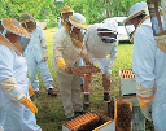Agriculture Reference
In-Depth Information
work may be due in part to doing most things the same way over a long time. This
may work for one individual but may not be at all practical for you. Keep all this
in mind when asking for and using advice.
You do not need to be an expert or experienced beekeeper to be an effective
officer in your local club. New voices, fresh outlooks, new skills, and added con-
tacts are generally welcome. Robert's Rules, taking minutes, creating web pages or
e-newsletters are just as important to the club as the skills necessary to introduce
queens.
Regional associations can be great resources for beekeepers, too.
Attending
a variety of meetings broadens your exposure and experience, exposes you to other
techniques and advances in management and pest control, and shares ideas that
will benefit your local club.
Larger, better funded associations (such as at the state level) may have the re-
sources and contacts to provide the latest legislative information, and to influence
laws, regulations, and funding that affect beekeeping and beekeepers.
All groups benefit from your support, both financial or time- and work-wise. Be
sure to take advantage of as many meaningful resources as you have the time for.
Most bee clubs meet at a member's bee yard, and new beekeepers can watch and
work with experienced instructors. A club may have a mentor program that en-
ables a new beekeeper to work with someone who has been keeping bees success-
fully for years.
• Float pieces of cork or small pieces of wood in pails of fresh water for the bees to
rest on while drinking.
• Install a small pool or water garden, or have birdbaths that fill automatically when
the water runs low.
• Set outside faucets to drip slowly (great for urban beekeepers), or hook up automatic
pet or livestock waterers.


